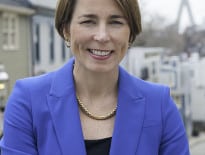If Amazon picks Greater Boston for its second headquarters, the $5-billion complex will likely be spread across a mix of existing buildings and new development, some of the region’s leading developers predict.
The e-commerce giant is seeking proposals from cities for a second headquarters to complement its existing Seattle home base, which totals 8.1 million square feet in 33 buildings.
The criteria for the “HQ2” project include metro areas with a population of over 1 million with strong technical talent pools. Amazon said a “development-prepped site” could be suitable for its real estate strategy, and that it would consider existing buildings, infill sites, new development or a combination of all three.
The latter option is most likely if Boston is Amazon’s choice, said Keith Wallace, senior managing director at DivcoWest which is developing the 45-acre NorthPoint site on the Cambridge-Boston line.
“Nobody hits everything on that list,” Wallace said. “They’re going to have to split it and grow a little bit over the next 10 years.”
On Tuesday, Bloomberg reported that Boston is a favored choice among some Amazon senior executives as it kicks off its site search. Factors working in Boston’s favor include the proximity to Harvard and MIT, Logan Airport’s expanding international routes and “a lower cost of living than many other big cities,” Bloomberg reported. In a statement, Amazon said “there are no front-runners at this point” with proposals due Oct. 19.
After establishing a research center in East Cambridge in 2013, Amazon occupied space in WeWork’s 31 St. James Ave. location in Back Bay last February and signed a 150,000-square-foot office lease at 253 Summer St. in Fort Point this summer.
Amazon said the 500,000-1-million-square-foot first phase would begin in 2019 with up to 8 million square feet for a final buildout beyond 2027. For new development, it’s seeking a site of at least 100 acres.
Amazon also made it clear it’s expecting a bidding war among cities for public financial incentives such as tax breaks, grants and land.
At a NAIOP Massachusetts real estate forum today, developers said Amazon would have to think creatively about how to check all of the boxes on its wish list in the Boston area.
“It’s going to have to go across a lot of different places,” said Steve Marsh, managing director of real estate for MIT Investment Management Co.
Amazon also asked cities to provide labor market information including the pool of software engineers.
In Seattle, Amazon has conducted extensive demographic research, said Bryan Koop, senior vice president and regional manager at Boston Properties.
“They are uber-sophisticated in terms of the talent search,” Koop said. “These people know exactly which neighborhoods have liberal arts degrees, which neighborhoods have tech degrees and the ages. It’s going to be so different than any other real estate decision we’ve seen before.”
Steve Purpura, executive managing director for Transwestern Consulting Group, sounded a note of skepticism. The arrival of Amazon and its estimated 50,000-strong workforce could upset the conditions that turned Cambridge’s Kendall Square into a tech and life science mecca, Purpura said.
“The beauty of our market is the collaboration, the early-stage startups,” he said. “You don’t want to this to be a one-company town.”




 |
| 

